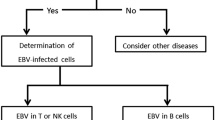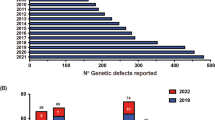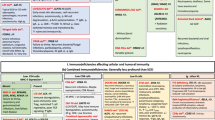Abstract
Hyper immunoglobulin M (HIGM) syndrome is a rare disorder of the immune system with impaired antibody functions. The clinical picture of the patients varies according to the underlying genetic variation. In this study, we identified two novel variants in AID and UNG genes, which are associated with autosomal recessive type HIGM, by targeted next-generation sequencing (NGS) panel. A biallelic 11 base pair deletion (c.278_288delATGTGGCCGAC) in the coding sequence of activation-induced cytidine deaminase (AID) gene was identified in a 36-year-old patient. Biallelic two base pair insertion in exon 7 of uracil nucleoside glycosylase (UNG) gene (c.924_925insGG) was identified in a 40-year-old patient. Both variants were confirmed by Sanger sequencing. HIGM, like many of the other primary immunodeficiencies, is a rare and difficult-to-diagnose entity with heterogeneous clinical phenotypes. It should be suspected in patients with a history of early-onset recurrent respiratory infections, enlarged lymph nodes, and autoimmune disorders. There might be a delay in diagnosis until adulthood especially in subtle cases or if HIGM is not included in the differential diagnosis due lacking of awareness. In this regard, genetic testing with NGS-based diagnostic panels provide a rapid and reasonable tool for the molecular diagnosis of patients with immunodeficiencies and hence, decrease the time to diagnose and prevent infection-related complications associated with increased morbidity and mortality.


Similar content being viewed by others
Data availability
Data are available on request from the authors.
Code availability
Not applicable.
References
Schneider LC. X-linked hyper IgM syndrome. Clin Rev Allergy Immunol. 2000;19(2):205–15.
Lougaris V, Badolato R, Ferrari S, Plebani A. Hyper immunoglobulin M syndrome due to CD40 deficiency: clinical, molecular, and immunological features. Immunol Rev. 2005;203(1):48–66.
Liu X, Zhou K, Yu D, Cai X, Hua Y, Zhou H, Wang C. A delayed diagnosis of X-linked hyper IgM syndrome complicated with toxoplasmic encephalitis in a child: a case report and literature review. Medicine. 2017;96(49).
Kutukculer N, Moratto D, Aydinok Y, Lougaris V, Aksoylar S, Plebani A, Notarangelo LD. Disseminated cryptosporidium infection in an infant with hyper-IgM syndrome caused by CD40 deficiency. J Paediatr. 2003;142(2):194–6.
Mazzolari E, Lanzi G, Forino C, Lanfranchi A, Aksu G, Ozturk C, Kutukculer N. First report of successful stem cell transplantation in a child with CD40 deficiency. Bone Marrow Transplant. 2007;40(3):279.
Lanzi G, Ferrari S, Vihinen M, Caraffi S, Kutukculer N, Schiaffonati L, Giliani S. Different molecular behavior of CD40 mutants causing hyper-IgM syndrome. Blood. 2010;116(26):5867–74.
Imai K, Slupphaug G, Lee WI, Revy P, Nonoyama S, Catalan N, Ochs HD. Human uracil–DNA glycosylase deficiency associated with profoundly impaired immunoglobulin class-switch recombination. Nat Immunol. 2003;4(10):1023.
Lee WI, Torgerson TR, Schumacher MJ, Yel L, Zhu Q, Ochs HD. Molecular analysis of a large cohort of patients with the hyper immunoglobulin M (IgM) syndrome. Blood. 2000;105(5):1881–90.
Etzioni A, Ochs HD. The hyper IgM syndrome—an evolving story. Pediatr Res. 2000;56(4):519.
Imai K, Catalan N, Plebani A, Maródi L, Sanal Ö, Kumaki S, Hermine O. Hyper-IgM syndrome type 4 with a B lymphocyte–intrinsic selective deficiency in Ig class-switch recombination. J Clin Investig. 2003;112(1):136–42.
Pecori R, Di Giorgio S, Lorenzo JP, Papavasiliou FN. Functions and consequences of AID/APOBEC-mediated DNA and RNA deamination. Nature Reviews Genetics. 2022;1–14.
Revy P, Muto T, Levy Y, Geissmann F, Plebani A, Sanal O, Tezcan I. Activation-induced cytidine deaminase (AID) deficiency causes the autosomal recessive form of the Hyper-IgM syndrome (HIGM2). Cell. 2000;102(5):565–75.
Trotta L, Hautala T, Hämäläinen S, Syrjänen J, Viskari H, Almusa H, Seppänen M. Enrichment of rare variants in population isolates: single AICDA mutation responsible for hyper-IgM syndrome type 2 in Finland. Eur J Human Genet 2016;1473.
Erdős M, Garami M, Rákóczi É, Zalatnai A, Steinbach D, Baumann U, Maródi L. Neuroendocrine carcinoma associated with X-linked hyper-immunoglobulin M syndrome: report of four cases and review of the literature. Clin Immunol. 2008;129(3):455–61.
Winkelstein JA, Marino MC, Ochs H, Fuleihan R, Scholl PR, Geha R, Conley ME. The X-linked hyper-IgM syndrome: clinical and immunologic features of 79 patients. Medicine. 2003;82(6):373–84.
Hervé M, Isnardi I, Ng YS, Bussel JB, Ochs HD, Cunningham-Rundles C, Meffre E, et al. CD40 ligand and MHC class II expression are essential for human peripheral B cell tolerance. J Exp Med. 2007;204(7):1583–93.
Lacroix-Desmazes S, Resnick I, Stahl D, Mouthon L, Espanol T, Levy J, Ochs H. Defective self-reactive antibody repertoire of serum IgM in patients with hyper-IgM syndrome. J Immunol. 1999;162(9):5601–8.
Moazzami B, Yazdani R, Azizi G, Kiaei F, Tafakori M, Modaresi M, Aghamohammadi A. Respiratory complications in patients with hyper IgM syndrome. J Clin Immunol. 2019;39(6):557–68.
Fazel A, Kashef S, Aleyasin S, Harsini S, Karamizadeh Z, Zoghi S, Rezaei N. Novel AICDA mutation in a case of autosomal recessive hyper-IgM syndrome, growth hormone deficiency and autoimmunity. Allergol Immunopathol. 2017;45(1):82–6.
Picard C, Gaspar HB, Al-Herz W, Bousfiha A, Casanova JL, Chatila T, Holland SM. International union of immunological societies: 2017 primary immunodeficiency diseases committee report on inborn errors of immunity. J Clin Immunol. 2018;38(1):96–128.
Muramatsu M, Sankaranand VS, Anant S, Sugai M, Kinoshita K, Davidson NO, Honjo T. Specific expression of activation-induced cytidine deaminase (AID), a novel member of the RNA-editing deaminase family in germinal center B cells. J Biol Chem. 1999;274(26):18470–6.
Longacre A, Storb U. A novel cytidine deaminase affects antibody diversity. Cell. 2000;102(5):541–4.
Minegishi Y, Lavoie A, Cunningham-Rundles C, Bédard PM, Hébert J, Côté L, Durandy A. Mutations in activation-induced cytidine deaminase in patients with hyper IgM syndrome. Clin Immunol. 2000;97(3):203–10.
Imai K, Catalan N, Plebani A, Maródi L, Sanal Ö, Kumaki S, Hermine O. Hyper-IgM syndrome type 4 with a B lymphocyte–intrinsic selective deficiency in Ig class-switch recombination. J Clin Investig. 2003;112(1):136–42.
Aghamohammadi A, Parvaneh N, Rezaei N, Moazzami K, Kashef S, Abolhassani H, Hammarström L, et al. Clinical and laboratory findings in hyper-IgM syndrome with novel CD40L and AICDA mutations. J Clin Immunol. 2009;29(6):769.
Quartier P, Bustamante J, Sanal O, Plebani A, Debré M, Deville A, Horneff G. Clinical, immunologic and genetic analysis of 29 patients with autosomal recessive hyper-IgM syndrome due to activation-induced cytidine deaminase deficiency. Clin Immunol. 2004;110(1):22–9.
Funding
This project is supported by Istanbul University Research Fund with the project numbers: TYO-2017–24271 and TTU-2016–21237.
Author information
Authors and Affiliations
Contributions
Yilmaz, H.; Fırtına, S.; Ar, M. C.; Sayitoğlu, M.; and Sarıtaş, M., designed the research; Ar, M.C.; Yilmaz, H.; Sayitoğlu, M.; Fırtına, S.; and Sarıtaş, M., conducted the review and editing; Ar, M. C., and Yilmaz, H., provided funding acquisition, project administration, and resources; Ar, M. C.; Yilmaz, H.; Sayitoğlu, M.; and Fırtına, S., wrote the paper.
Corresponding author
Ethics declarations
Ethical approval
All procedures performed in studies involving human participants followed the institutional research committee’s ethical standards and the 1964 Helsinki declaration and its later amendments or comparable ethical standards.
Consent to participate
The patients consent to the use of their clinical information to the redaction of this study.
Consent for publication
The patients formally consented to the use of their clinical information to be published for this study.
Competing interests
The authors declare no competing interests.
Additional information
Publisher's note
Springer Nature remains neutral with regard to jurisdictional claims in published maps and institutional affiliations.
Springer Nature or its licensor holds exclusive rights to this article under a publishing agreement with the author(s) or other rightsholder(s); author self-archiving of the accepted manuscript version of this article is solely governed by the terms of such publishing agreement and applicable law.
Rights and permissions
About this article
Cite this article
Yilmaz, H., Fırtına, S., Sarıtaş, M. et al. Somatic hypermutation defects in two adult hyper immunoglobulin M patients. Immunol Res 70, 811–816 (2022). https://doi.org/10.1007/s12026-022-09310-y
Received:
Accepted:
Published:
Issue Date:
DOI: https://doi.org/10.1007/s12026-022-09310-y




